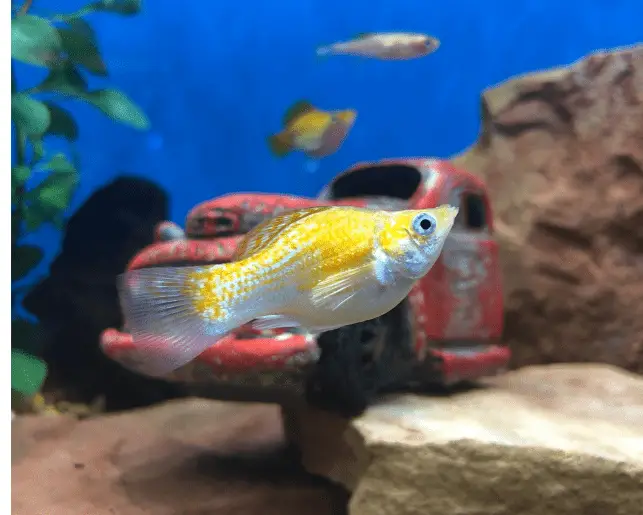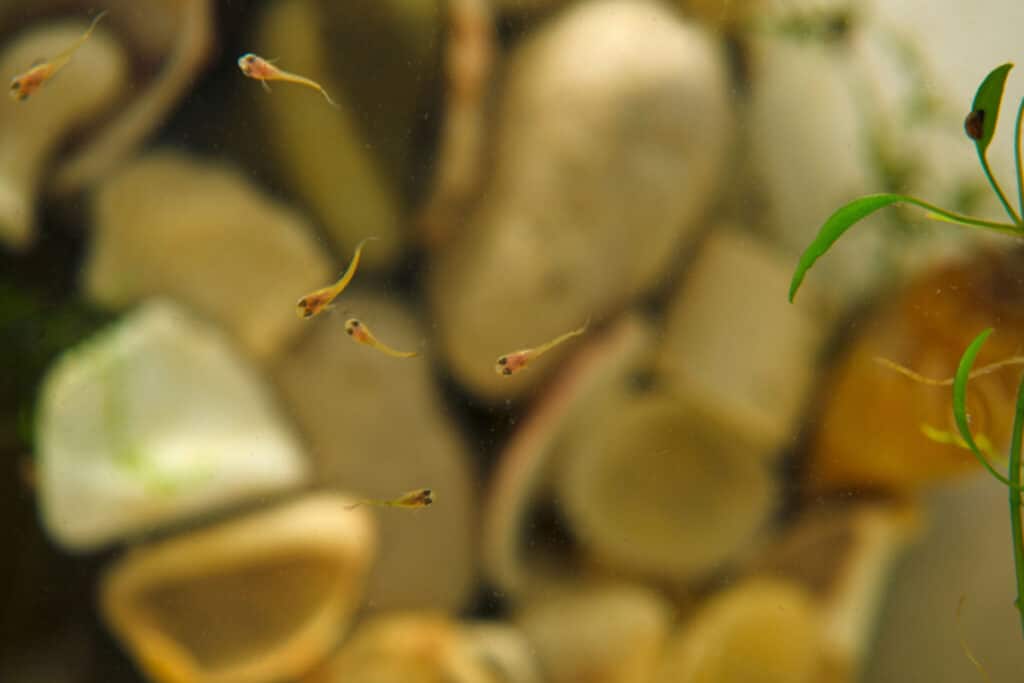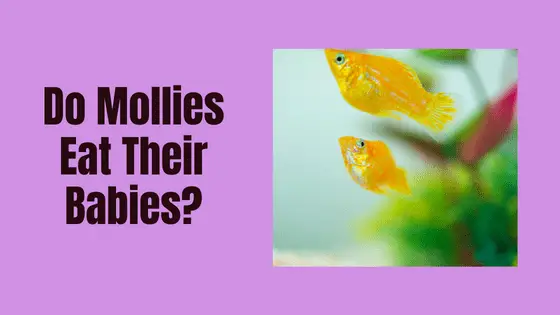Mollies are one of the more popular fish to keep, especially if you are a beginner to the hobby. Even if you know nothing about fish, we bet that you’ve heard of mollies! They are friendly little fish that love all environments and are great for first time fish owners.
Mollies tend to be very peaceful fish and will spend their days idly swimming around their tank without a care in the world. However, another thing that you should know about them is that they reproduce very easily.
When these fish decide that they want to reproduce, though, their once peaceful nature can get a little disturbing…
Today we’re looking into whether mollies eat their babies or not, and how you can prevent the possibility of this happening.
Do Mollies Eat Their Offspring?
Yes, mollies have been known to eat their babies. While they are very peaceful fish in all other instances, it is very common for mollies to eat their offspring.
This is what is known as filial cannibalism, and there is not much information out there as to why it happens.
Many people may be horrified to learn that their mollies would eat their babies, but it is a very common thing to happen.
Baby fish are so tiny when they first appear that you’d often not notice them in a tank unless you were looking for them. As mollies are already quite small in themselves, their babies are also very petite.
A molly fish can easily have up to 20 babies at once. While a molly might not eat all of its babies, it’s almost certain that they will eat at least a few of them.
Many molly owners have reported on fish forums about their fish eating their fry – it just seems to be a normal way of life for these fish.
However, don’t fret just yet. There are ways that you can help prevent your molly from eating its babies, you just need to be vigilant with protection.
Why Do Mollies Eat Their Fry?

A fry is another word for very young fish. But other than the strange, and somewhat culinary name for them, why would a molly want to eat its own offspring? Unfortunately, as we cannot communicate with fish as of yet, we do not have a definitive answer to this question.
Marine scientists have been trying to answer this question for years, but they still have not come to a satisfactory answer that will suitably explain this strange behavior.
The main reason why scientists have still not come to an explanation is because they don’t explain the reason behind all filial cannibalism. Many species of animal partake in this activity, but there is not a clear link between them or why they do it.
However, with that being said, scientists do have a few possible reasons for why mollies eat their babies. We have outlined these below to give you a deeper insight into why your fish might have eaten its fry.
Their Babies Are So Small.
If you’ve never seen a molly baby, you might not understand how small they actually are.
They can often be even smaller than the fish flakes that you feed the mollies! For this reason, your adult molly might get confused with the tiny baby fish and think that it is food.
This is one of the more plausible reasons, and also the less sinister reason. It’s not because your fish intentionally wants to be a cannibal – they just got confused and thought that their babies were fish food!
Psychological Stress Factors.
Most of us are familiar with postpartum depression in humans once they have a baby, but we don’t often consider its effects on other species other than humans.
Fish tend to remain in denial once they have had their babies, and some fish even abandon their fry.
It isn’t out of the realm of possibility these fish could feel anxious or even angry that they have had their babies, and therefore want to get rid of them.
To stop these feelings of anxiety or anger, they might get rid of their babies in the quickest way possible – by eating them. This can improve their self-preservation instinct and ensure that they are looking out for themselves rather than their babies.
Who’s Tough Enough?
Mollies can lay between 10 and 20 fry within just hours – that’s a lot of babies to look after! They can also reproduce every single month, meaning that overpopulation is a real worry with these fish.
For this reason, they might decide to only keep the ones that are strong enough to make it in life and eat the rest.
This is another potential humane reason for eating their offspring. They don’t want to see their weaker fish suffer in the wild. If they know that they will die anyway, why not get it over and done with quicker and eat them?
Alternatively, it could be down to a more selfish reason that they do this. Your mollies might want to keep themselves safe, and a slow baby fish tagging along with them is going to expose them and put them in danger.
If their babies are risking the family’s safety, the adult molly might decide to eat the weak baby for the rest of the family.

Out Of Necessity.
When a molly has no other choice and cannot find another way to find food, they might decide to eat their babies in order to save themselves. If there isn’t much food in your aquarium, they might decide to eat their babies as they feel like they have no other choice.
Alternatively, they could eat their babies if they saw them to be competition for their food source. If they don’t want to share their food, they might decide to get rid of the weaker fish in order to keep their meals larger.
How Can I Stop my Molly Fish Eating Their Fry?
The best way to stop your molly from eating their fry is by buying a breeding box. It is a plastic box that fits onto the inside of your fish tank and has 2 compartments; an upper and a lower compartment. When the female molly is close to giving birth, she should be put into the upper part of the breeding box. There are holes where the fry can go through to the lower compartment without fear of being eaten by their mother, who is in the upper compartment.
Once the mother has given birth, she can return to the main tank. The fry can stay in the breeding box for no more than 10-14 days, by this point they will have grown quite considerably.
This is a very good breeding box that is very well priced.

Summary.
We hope that this article has given you a better understanding of why your Mollies might be eating their babies.
There could be a number of reasons why they do this, but we still don’t have a definitive answer unfortunately. Mistaking them for food, psychological factors, and competition are some of the more likely reasons behind this filial cannibalism.
This video is a time-lapse video showing the first 30 days in the life of some tiny baby molly fish.

